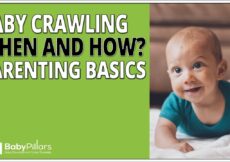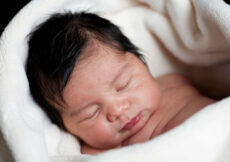Breastfeeding is a journey where what you eat, you share with your little one via breast milk. It means that your dietary choices impact your baby’s nutritional intake as well. Hence, making healthy food choices is necessary not just for you but for your baby as well.
Out of several foods a breastfeeding mother consumes, fish deserves double-check of safety. Fish is likely to contain organic mercury that can pass to the baby through breast milk. The element could cause adverse effects if it passes into the baby’s body in high amounts (1).
This post gives you an insight into the benefits and side effects of consuming fish when breastfeeding.
Can You Eat Fish When Breastfeeding?
According to the Dietary Guidelines For Americans 2020-2025, “Women who are pregnant or lactating should consume at least eight and up to 12 ounces of a variety of seafood per week, from choices lower in methylmercury.”
Fish is low-fat seafood that can provide high-quality protein and other essential nutrients, such as iodine, vitamin D, and B2, that most common foods usually lack (2) (3). These nutrients support your long-term health and your baby’s growth and development. However, you need to stay cautious about what types of fish you eat and in how much quantity.
Fish That Are Safe To Eat When Breastfeeding
Generally, all fish have some amount of mercury. Thus, avoiding mercury entirely when eating fish may not be possible. However, you could choose fish with lower mercury levels.
According to the American Pregnancy Association, nursing women should consume two to three servings of low-mercury fish per week (4). You may choose oily fish since they have relatively low mercury content.
Here’s a detailed list by the US Food and Drug Administration (US FDA) that gives you a brief overview of what type of fish you should eat and the ones to avoid (5).
Source: US Food And Drug Administration
The American Heart Association suggests eating a variety of best and good choice fish to minimize the adverse effects of environmental pollutants, such as mercury (6). Also, eating various best and good choice fish gives you various nutrients. Avoid fish listed as “choices to avoid” since they usually contain high levels of mercury. Check your local fish advisory before eating fish caught fresh. If no advisory exists, eat only one serving of the fish that week.
Possible Health Benefits Of Fish When Nursing
Fish contains several vital macro and micronutrients, some of which can pass through breast milk to your baby and promote your and your baby’s long-term health. Here’s a brief overview of the possible benefits that eating fish in moderation as a part of a healthy diet could offer.
- Provides several nutrients: Fish has various nutrients, such as protein, selenium, iodine, omega-3 fatty acids, vitamin D, and B12 (7). Nursing mothers require these nutrients to support the lactation process, hasten postpartum recovery, and maintain overall health. Also, as some of these nutrients pass to the baby via breast milk, they help the baby grow and develop healthily.
- Facilitates physiological functions: Breastfeeding women between the ages of 19 and 30 years require 71g of protein a day (2). One cup (136g) of cooked, flaked salmon can offer 35.1g of high-quality protein, approximately 50 percent of the RDA (8). Protein helps in cellular repair, regeneration, and growth, vital for postpartum healing and recovery.
- Supports heart health: Fish is low in saturated fat and contains significant omega-3 fats that help maintain your long-term heart health and reduce postpartum depression risk (4). As for your baby, omega-3 fatty acids, such as EPA (eicosapentaenoic acid) and DHA (docosahexaenoic acid), support brain, eye, and nervous system development.
- Promotes overall health: Maternal fish consumption in moderation as a part of a healthy diet is beneficial for both mother and the baby. Eating fish could offer several micronutrients, such as vitamin A, B, D, phosphorus, potassium, and selenium, which help regulate several vital physiological functions, supporting overall health.
You may choose fatty fish, such as salmon and tuna, as these are rich in protein, omega-3 fatty acids, and other vital nutrients, such as selenium and iodine (9).
Possible Risks Of Eating Fish When Breastfeeding
Eating fish doesn’t cause any issues provided you select the right fish type. Nevertheless, there are some potential risks associated with fish intake.
1. Ingestion of environmental pollutants
Fish are likely to contain hazardous pollutants, such as organic mercury (methylmercury) and PCBs, whether fresh or canned. These chemicals enter fish’s bodies through the water they dwell in and the food they eat. Babies receive these chemicals through breast milk when their mothers consume fish too frequently or eat high-mercury fish, such as swordfish, shark, and tuna (bigeye).
Long-term exposure to high amounts of chemicals, such as mercury, can affect the infant’s growth and development, impacting the immune, digestive, and nervous systems, including the brain (10). Hence, eating low-mercury fish in moderation is the key to safety (11).
2. Allergy
Fish is a common allergen and may trigger an allergic reaction in breastfed infants whose mothers consume fish frequently. Experts now believe that a nursing mother should consume common allergens, such as fish, to sensitize the baby to allergen and reduce the risk of allergy (12). However, if you have a family history of allergy or the baby’s father is allergic to fish, consult your healthcare provider and avoid eating fish, as it may trigger an allergic reaction in exclusively breastfed infants (13).
Eating the right fish within the recommended amount as a part of a well-balanced diet is advisable to reap the benefits of fish to its full potential. One must know the proper tips to buy and store fish to make a healthy choice.
Tips To Select And Store Fish
Here are some tips to consider when buying and storing fish.
Selecting fresh fish
- Smell the fish. A fresh fish doesn’t smell fishy; instead, it should smell like brine.
- Inspect fish’s skin by poking it. A fresh fish’s flesh is clean, shiny, firm yet slippery to touch, and bounces back on poking. Additionally, its gills have a deep reddish-pink color with marbling.
- Avoid fish with bruises or brown spots, especially on their edges and belly. If the fish’s edges are curling up, it is most likely not fresh.
- Check their eyes carefully. Fresh fish have clear and bright eyes. Sunken, cloudy eyes indicate the fish is likely not fresh.
- If you buy canned fish, look for options packed in properly sealed cans free from dents and rust. Also, check the ingredient list and select low sodium options. Finally, make a note of the best-before date to ensure the fish’s quality.
- Stay cautious while selecting canned fishas some may contain additional contaminants, such as BPA, lead, and cadmium, due to handling and processing lapses. Choose canned fish from a trusted brand or company.
- When buying frozen fish, ensure the fish is packed in a properly sealed vacuum package with no loose ends. Also, check the fish’s surface and see that it doesn’t have ice crystals or cottony patches, indicating freezer burn.
Storing fish
- As soon as you get the fresh fish home, refrigerate it immediately between 0°Cto 4°C.
- Use the fresh fish within one to two days. If the fish is packaged, refer to the packaging for the best before date.
- Store unused fresh fish in a vacuum or airtight freezer bag in the refrigerator for up to three months.
- Store canned fish unopened at room temperature for up to three months and in the freezer for three years. Check the best before date while purchasing the can.
- Once the can is open, remove the fish from the can, store it in an airtight freezer container or bag, and use three to four days.
Ways To Include Fish In Your Breastfeeding Diet
Nursing mothers can eat well-cooked, baked, broiled, roasted, grilled, and braised fish dishes across different meals. You can also eat raw fish dishes, such as sushi. But, stay cautious as raw fish intake raises the risk of infection due to the possibility of contamination. Also, you can consume canned fish but in moderation.
Fish is a nutritious food that nursing mothers should include in their breastfeeding diet. Experts advise breastfeeding moms to eat two to three servings of low-mercury fish, such as salmon and tuna. One can consume fish in baked, grilled, roasted, broiled, and steamed forms across meals. Eating fish as a part of a well-balanced diet can offer mothers and their breastfeeding babies several health benefits.
References:
MomJunction’s health articles are written after analyzing various scientific reports and assertions from expert authors and institutions. Our references (citations) consist of resources established by authorities in their respective fields. You can learn more about the authenticity of the information we present in our editorial policy.



































